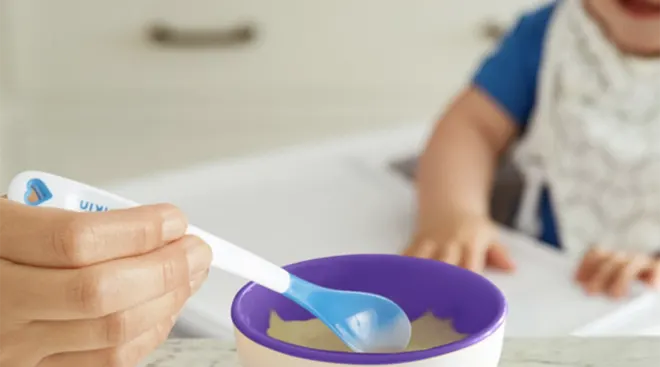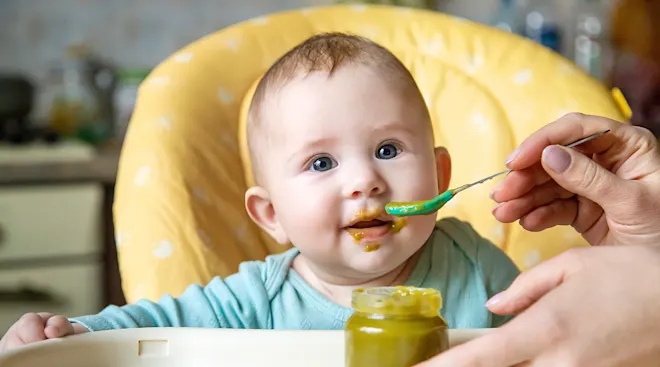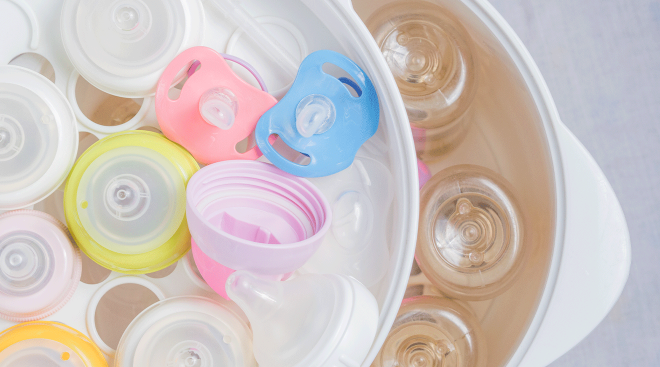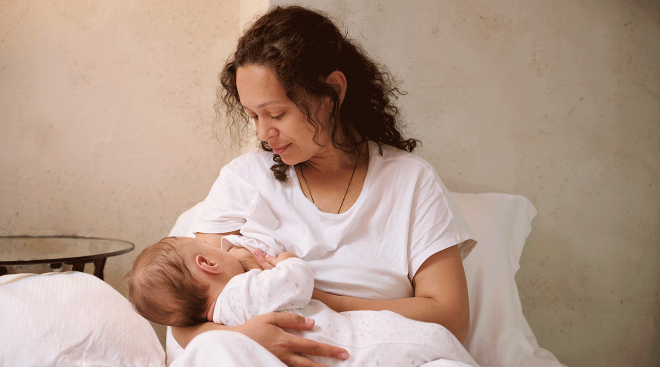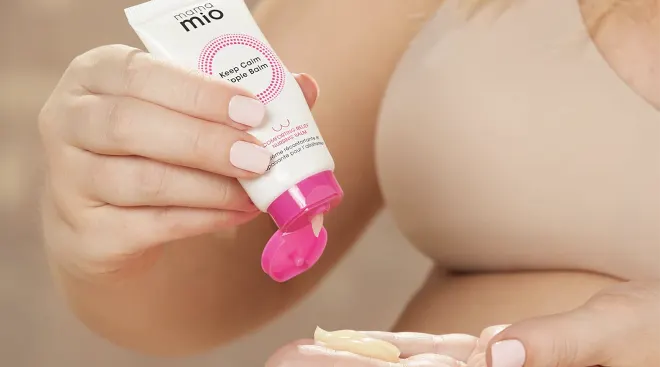Starting baby on solids is an exciting milestone in their development, but it might leave you wondering what foods you can introduce and when—like yogurt, which is a staple across many diets due to its nutritional value. So when can babies have yogurt? Here, we asked experts to walk us through the timeline, how much to give them, the benefits of yogurt for babies, what types are best and how to prepare it for your little eater.
According to the American Academy of Pediatrics, in addition to breast milk and formula, parents should start supplementing baby’s diet with soft, solid foods when they’re around 6 months old—and yogurt makes for a perfect first food. In fact, not only can babies have yogurt as early as 6 months, according to Denise Scott, MD, an Oklahoma-based pediatrician and expert with JustAnswer, but she also notes it’s a baby food with several health benefits.
Yogurt has long been touted for its role in achieving a healthy gut, including for babies. Most yogurt sold in U.S. grocery stores is made from pasteurized milk with added live cultures, also known as probiotics. “[These] are bacteria that are good for the gut and promote a healthy gut microbiota,” Scott says. In addition to probiotics, yogurt is also loaded with protein and many nutrients, including calcium, phosphorus, magnesium and B vitamins.
Another benefit of yogurt for babies? It’s an ideal first food, thanks to its smooth texture, says nutrition expert Frances Largeman-Roth, RDN. Plus, she points out, you can combine it with various fruits and vegetable purees to help baby discover new flavor profiles, and even potential allergens, like peanut butter.
According to Largeman-Roth, the best yogurt for babies is plain, unsweetened, whole milk yogurt. (You also want to ensure the yogurt is made with pasteurized milk, though most commercially sold yogurt is.) Scott says babies should be given full-fat yogurt until they’re 2 years old, since “they need fat for their developing brain.”
When shopping at the grocery store, don’t worry about buying baby-specific yogurt. “There really is no difference between these and regular yogurts,” Scott says. In general, she recommends avoiding yogurt that has anything added to it, such as flavorings or dye (more on this below).
Parents can opt for regular or Greek yogurt, as well as labneh, which is a strained yogurt common in Middle Eastern cuisines. “Just make sure that it’s the consistency of yogurt and not soft cheese,” Scott adds.
A common concern parents have when baby starts solids is avoiding any choking hazards. Luckily, plain yogurt without anything added is generally not considered a choking hazard and is typically a good consistency for baby. However, all solids are potential choking hazards when babies first start on them, Scott warns. “Babies don’t yet chew and can sometimes take more in their mouths than they can handle.” That’s why babies and toddlers should never be left unattended while eating, and should be seated in an upright position while eating, not laying down or playing.
Keep an eye on ingredients
The biggest thing to keep in mind when giving baby yogurt is to check the ingredients. With all the types of yogurt available these days, you want to ensure you’re picking one that’s safe for baby to consume. Below, some ingredients Scott recommends avoiding:
-
Added chunks: These could be fruit, chocolate, nuts, granola or something else. Though these chunks are fine for older kids, they could pose a choking hazard for babies and toddlers.
-
Added honey: Honey can cause a rare but serious condition called botulism in infants younger than a year old. It’s usually safe to offer toddlers yogurt with honey after their first birthday, but check with your pediatrician beforehand.
-
Added sugars: Along with honey, you’ll want to steer clear of yogurt with added sugar. According to the most recent USDA dietary guidelines, children under 2 years old shouldn’t be given any added sugars. “It’s best to avoid yogurt with added sugars at any age and to add your own ingredients to the yogurt,” Scott says.
Allergic reactions to look for when giving baby yogurt
Another common concern when starting baby on solids? Food allergies. “Since yogurt is made from milk, and milk is one of the most common sources of food allergies, yogurt can be a source of allergens,” Scott says. (An added benefit of serving yogurt without anything in it is that it’s easier to tell if baby is allergic to the yogurt vs. another ingredient.)
The signs of an allergic reaction in babies can be varied, but the most common ones to look for include:
- Vomiting
- Rash on the face or body
- Flushed (red) skin
- Coughing or wheezing
- Any swelling around the face, lips or tongue
- Difficulty breathing
- Diarrhea, especially with blood in the stool
These signs can develop immediately or up to two hours after consumption, Scott notes. If you see an allergic reaction, stop giving baby yogurt. For severe reactions, like breathing difficulties, parents should call 911 and seek medical attention. For more mild reactions, Scott recommends calling your pediatrician, who may recommend an antihistamine, such as Benadryl or Zyrtec. They can also best advise you on next steps and whether allergy testing should be done.
When it comes to giving baby yogurt, there really isn’t any special preparation required. The most important step is ensuring it’s free of harmful ingredients. Other than that, Scott says, you can offer baby yogurt while it’s still cool or at room temperature. “There is no need to add anything to the yogurt, but it can also be mixed with other baby foods,” she says. “Once a child is older, past one to 2 years of age, you can add small pieces of fruit to the yogurt, which is healthier than buying yogurt with added fruit.”
Wondering how much yogurt to give baby? Largeman-Roth says there’s no defined amount. “Complementary foods, like yogurt, don’t need to be measured out,” she explains. “Baby isn’t eating solids for growth at this point—they’re more for food exploration, exposure and development of oral-motor skills.” It’s okay to offer yogurt as a snack daily or several times a week. By the time baby is 9 to 12 months old, both experts say a serving size between a quarter and half cup of yogurt is sufficient for baby.
Overall, yogurt can be a healthy first food for baby. However, as is true with all new foods, Scott recommends introducing one new food at a time and watching closely for signs of allergies.
About the experts:
Denise Scott, MD, is a pediatrician with JustAnswer and a pediatric endocrinologist based in Oklahoma with over 30 years of experience. Certified in culinary medicine, Scott also runs the blog Feed Future Health and is the author of Feed Your Child’s Future Health: Prevent Disease before it Starts. She received her medical degree from the University of Texas Medical Branch and completed her residency at the University of Oklahoma Health Sciences Center, with a fellowship at the National Institutes of Health.
Frances Largeman-Roth, RDN, is a nutrition expert and New York Times best-selling author of the books Feed the Belly: The Pregnant Mom’s Healthy Eating Guide and Eating in Color: Delicious, Healthy Recipes for You and Your Family. She earned her undergraduate degree from Cornell University and went on to complete her dietetic internship at Columbia University.
Please note: The Bump and the materials and information it contains are not intended to, and do not constitute, medical or other health advice or diagnosis and should not be used as such. You should always consult with a qualified physician or health professional about your specific circumstances.
Plus, more from The Bump:
Navigate forward to interact with the calendar and select a date. Press the question mark key to get the keyboard shortcuts for changing dates.



































